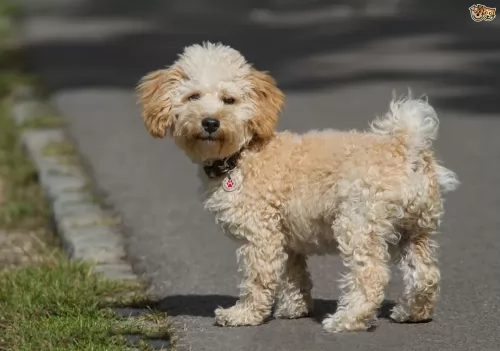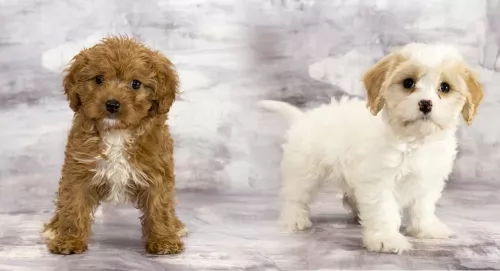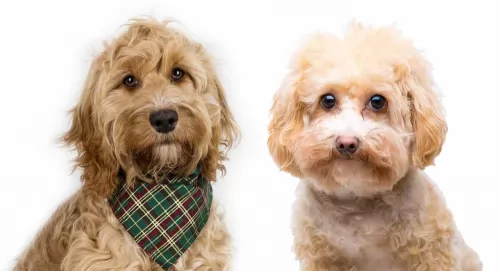 Petzlover
Petzlover Cavapoo is originated from United States but Mudi is originated from Hungary. Cavapoo may grow 14 cm / 5 inches shorter than Mudi. Both Cavapoo and Mudi are having almost same weight. Both Cavapoo and Mudi has almost same life span. Cavapoo may have less litter size than Mudi. Both Cavapoo and Mudi requires Moderate Maintenance.
Cavapoo is originated from United States but Mudi is originated from Hungary. Cavapoo may grow 14 cm / 5 inches shorter than Mudi. Both Cavapoo and Mudi are having almost same weight. Both Cavapoo and Mudi has almost same life span. Cavapoo may have less litter size than Mudi. Both Cavapoo and Mudi requires Moderate Maintenance.
 The Cavapoo, known also as the Cavoodle, is a small dog – a mix of a miniature Poodle and a Cavalier King Charles Spaniel.
The Cavapoo, known also as the Cavoodle, is a small dog – a mix of a miniature Poodle and a Cavalier King Charles Spaniel.
He hasn’t got a long history, but each of the dogs he comes from – the Cavalier King Charles Spaniel and the Poodle – have longer histories. The Cavapoo started being bred in the United States, but he has a short history in America. In Australia, they were first bred in the 1990s.
Today, as a hybrid, the Cavapoo isn’t recognized by the American Kennel Club but he is recognized by the American Canine Hybrid Club as well as the Designer Dogs KennelClub.
 Sometime between the 4th and 6th centuries, the Great Migration – a variety of dogs came to live in the Carpathian Mountains on the Great Hungarian Plain. This migration period brought sheepdogs and herders brought by shepherds. These dogs were of two sizes both small and large. The smaller ones were bred together – Pumi, Puli, and Mudi. Because of this, these breeds share the same history, with the Mundi being the oldest of them all.
Sometime between the 4th and 6th centuries, the Great Migration – a variety of dogs came to live in the Carpathian Mountains on the Great Hungarian Plain. This migration period brought sheepdogs and herders brought by shepherds. These dogs were of two sizes both small and large. The smaller ones were bred together – Pumi, Puli, and Mudi. Because of this, these breeds share the same history, with the Mundi being the oldest of them all.
The Mundi was finally separated from the other breeds about 1930 when Dr. Deszo Fenyesi began to breed them. It was in 1966 when the F.C.I. finally approved the standard for the breed. Still then as today, there were not many breeders developing the Mudi. They are working dogs – farm dogs – herders, guard dogs and ratters. He is also known as a tracker, with the majority of the breed living in Hungary.
As the Mudi was bred separately from the Pumi and the Puli, differences between the breeds became clear. Many Mudi are born with a stump or no tail at all. The Mudi is not a great dog for the first timer. He is stubborn, assertive and needs a lot of socialization and exercise. In 2004 breeders in the United States created the Mudi Club of America to preserve the breed and foster responsible ownership. This is a clever, active and keen breed, very loyal to his family but wary of strangers. The United Kennel Club recognized the breed in 2006.
In Hungary, these are still a breed of herding dogs capable of running 500 sheep at a time. They are versatile, courageous, intelligent and agile. They are great in obedience trials, agility, and flyball. In Finland and the United States, they also work as search and rescue dogs.
 The Cavapoo can be found in different colors and he can be blonde, white, brown, white or black or even tri-colored. Sometimes the coat can be a little bit curly but it can also sometimes be a long, silky coat from the Cavalier.
The Cavapoo can be found in different colors and he can be blonde, white, brown, white or black or even tri-colored. Sometimes the coat can be a little bit curly but it can also sometimes be a long, silky coat from the Cavalier.
Dogs crossed with poodles, such as the Cavapoo, are known to be hypoallergenic, but there is really no 100% guarantee that he will be hypoallergenic.He has a round face with large, brown eyes and long ears. He can adapt easily to life in the city or in the countryside.
The Cavapoo is a small dog breed that has been bred to be an amicable pet. He gets along well with adults and children as well as other pets in the home. He stands about 28–33cm in height and can weigh anything from 5 to 12 kg.
He is an intelligent little dog, alert and inquisitive. Even a small, non-aggressive dog such as the Cavapoo can do well with training and socialization as he is quick to learn. With this socialization he becomes an obedient, affectionate, well behaved 4-legged family member.
Loyal and friendly, the Cavapoo thrives on human companionship and he just loves to be involved in everything the family is getting up to. He isn’t a dog that can be left on his own too long as this is when he develops irritating behavior patterns such as ongoing yapping and barking.
 This is a medium size dog with an almost square profile. They have erect ears on wedge-shaped heads. He is not a strong boned but medium boned. That square profile is based in large part on their very square stance. Their muzzle is about half the length of their head and they have what is considered a “dare devil” expression in their dark, almond-shaped eyes. The color of the eyes is important and must match with the color of the dog or the standard is not met.
This is a medium size dog with an almost square profile. They have erect ears on wedge-shaped heads. He is not a strong boned but medium boned. That square profile is based in large part on their very square stance. Their muzzle is about half the length of their head and they have what is considered a “dare devil” expression in their dark, almond-shaped eyes. The color of the eyes is important and must match with the color of the dog or the standard is not met.
Merle fur – brown, brown speckled, blue eyes.
Brown or gray-brown fur – Brown eyes
Gray fur – gray eyes
What is not acceptable is having yellow eyes and black fur; pink eyes and white fur. The lips, eye rims, and nose must all have the same pigmentation. This should be black in all but the brown and brown-grey dogs. These dogs have brown noses, eye rims, and lips. The tail can be almost anything from full to bob. All are considered to be natural lengths for a Mudi.
Their coat is self-cleaning and won’t mat. It is on the long side. In fact, a short, flat, smooth coat is a disqualification from the standard. The color of the coat ranges from white to brown to gray, gray-brown, merle, golden, cream and white. Very little markings of any kind are usual.
 Pet lovers who welcome a Cavapoo into their home aren’t going to be disappointed if they stick to their side of the bargain and provide their pet with lots of love and care.
Pet lovers who welcome a Cavapoo into their home aren’t going to be disappointed if they stick to their side of the bargain and provide their pet with lots of love and care.
The Cavapoo suits any kind of family because he is playful, loving, loyal and comes with a balanced and amicable personality.
Keep him happy with good food, clean water and lots of your attention and he’ll respond by being the perfect companion for you.
 Yes, they are great with children and love being a part of a large family or “pack”.
Yes, they are great with children and love being a part of a large family or “pack”.
They are extremely versatile and great at herding and guarding.
They are adaptable if you are. They don’t need to live in the country, but they need space to run and play.
They are highly intelligent but a little stubborn. Their ability to learn is high but you have to be the boss.
 The Cavapoo is considered a healthy little dog who is active and energetic. Because he is a hybrid, he could develop illnesses associated with either of the dog types he comes from. However this is highly unlikely and you can expect up to 15 years from your Cavapoo if you feed him correctly and shower him with lots of love and attention.
The Cavapoo is considered a healthy little dog who is active and energetic. Because he is a hybrid, he could develop illnesses associated with either of the dog types he comes from. However this is highly unlikely and you can expect up to 15 years from your Cavapoo if you feed him correctly and shower him with lots of love and attention.
Dogs with long, floppy ears tend to be more prone to ear infections. You’ll have cause for concern when you see your dog scratching his ears or shaking his head. There are one or two reasons why your Cavapoo may get an ear infection, and food allergies could be one.
A food allergy can bring about inflammation that can lead to infections. Moisture and excessive wax can also cause an ear infection. You can use cotton wool and some ear cleaner to remove dirt and moisture, but if in any doubt, speak to your vet or get your pet to the vet for advice.
Small dogs are more prone to dental disease, and your Cavapoo’s teeth should be brushed 2 or 3 times a week with a vet-approved special dog toothpaste and brush. This can prevent dental decay which can bring about a whole lot of problems with his teeth but also with other parts of the body.
 The Mudi does face several of the problems that medium to large dogs often face and some eye issues as well.
The Mudi does face several of the problems that medium to large dogs often face and some eye issues as well.
 The Cavapoo doesn’t shed much so he won’t need that much grooming, although there are people who take him to a doggy parlor to see that the hair is trimmed into shape. If not, then a good brushing twice a week will ensure the hair doesn’t matt and that it remains free of lots of dead hair.
The Cavapoo doesn’t shed much so he won’t need that much grooming, although there are people who take him to a doggy parlor to see that the hair is trimmed into shape. If not, then a good brushing twice a week will ensure the hair doesn’t matt and that it remains free of lots of dead hair.
With any dog, and not just the Cavapoo, you want a food that boosts energy and promotes longevity. The Cavapoo breed is energetic and lively, and it is this stamina of his that will require you feeding him top quality food that is rich in nutrients.
Small dogs have a higher calorie need than large dogs because their metabolisms are much faster. Protein and fat are important nutrients for small-breed dogs and these nutrients need to come from high-quality sources. Speak to your vet about the best food for your Cavapoo and always ensure that he has a bowl of clean water available.
 The Mudi needs a high quality, medium breed puppy dry food and should be fed 3 or 4 times a day for a total of 1 and ½ to 2 cups.
The Mudi needs a high quality, medium breed puppy dry food and should be fed 3 or 4 times a day for a total of 1 and ½ to 2 cups.
The adult should be fed at least twice a day with an adult medium breed high-quality dry dog food. Don’t overfeed as the breed can have a tendency toward obesity.
They have great stamina and agility.
This is a working dog and like most herding dogs, they need a job and a lot of activity. Long walks every day and either a large yard or visits to a dog park. Involve them in herding activities or Barn Hunt if you can. Playing is their way of working when they are not herding real animals. So, if you want this breed, be sure you have time for playing with them. They are great at agility, flyball, obedience, frisbee trials, tracking and of course herding